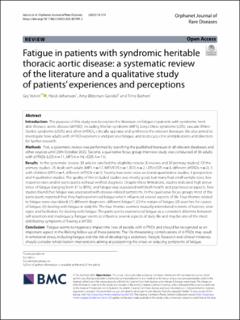| dc.description.abstract | Introduction The purpose of this study was to explore the literature on fatigue in patients with syndromic herit‑
able thoracic aortic disease (sHTAD), including Marfan syndrome (MFS), Loeys‑Dietz syndrome (LDS), vascular Ehlers
Danlos syndrome (vEDS) and other sHTADs, critically appraise and synthesize the relevant literature. We also aimed to
investigate how adults with sHTAD experience and perceive fatigue, and to discuss clinical implications and direction
for further research.
Methods First, a systematic review was performed by searching the published literature in all relevant databases and
other sources until 20th October 2022. Second, a qualitative focus group interview study was conducted of 36 adults
with sHTADs (LDS n = 11, MFS n = 14, vEDS n = 11).
Results In the systematic review, 33 articles satisfied the eligibility criteria (3 reviews and 30 primary studies). Of the
primary studies: 25 dealt with adults (MFS n = 17, MFS/EDS n = 1, EDS n = 2, LDS/vEDS n = 3, different sHTADs n = 2), 5
with children (MFS n = 4, different sHTADs n = 1). Twenty‑two were cross‑sectional quantitative studies, 4 prospective
and 4 qualitative studies. The quality of the included studies was mostly good, but many had small sample sizes, low
response rates and/or participants without verified diagnosis. Despite these limitations, studies indicated high preva‑
lence of fatigue (ranging from 37 to 89%), and fatigue was associated with both health and psychosocial aspects. Few
studies found that fatigue was associated with disease‑related symptoms. In the qualitative focus groups most of the
participants reported that they had experienced fatigue which influenced several aspects of life. Four themes related
to fatigue were elucidated: (1) different diagnoses–different fatigue?, (2) the nature of fatigue, (3) searches for causes
of fatigue, (4) dealing with fatigue in daily life. The four themes seemed mutually interrelated in terms of barriers, strat‑
egies and facilitators for dealing with fatigue. The participants experienced fatigue as a consistent dilemma between
self‑assertion and inadequacy. Fatigue seems to influence several aspects of daily life and may be one of the most
debilitating symptoms of having a sHTAD.
Conclusion Fatigue seems to negatively impact the lives of people with sHTADs and should be recognized as an
important aspect in the lifelong follow‑up of these patients. The life‑threatening complications of sHTADs may result
in emotional stress, including fatigue and the risk of developing a sedentary lifestyle. Research and clinical initiatives
should consider rehabilitation interventions aiming at postponing the onset or reducing symptoms of fatigue. | en_US |

